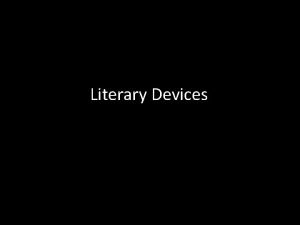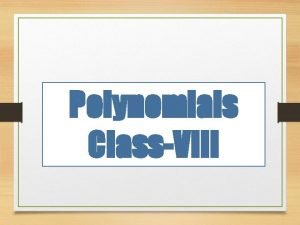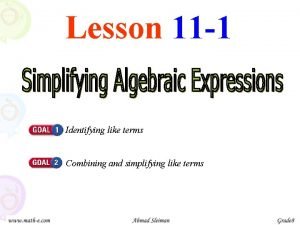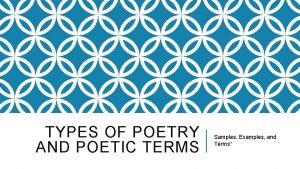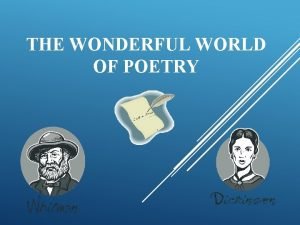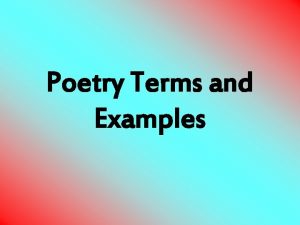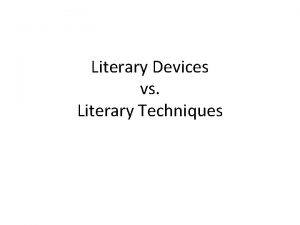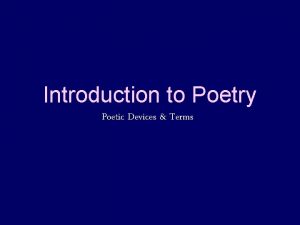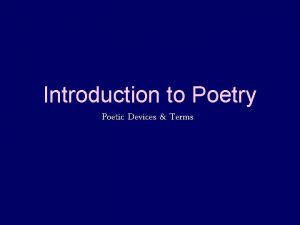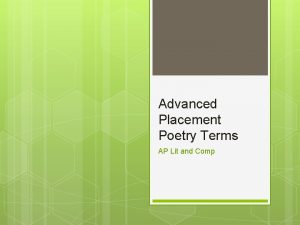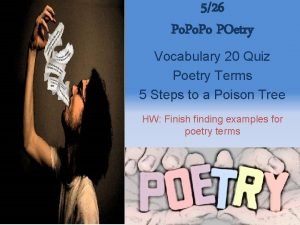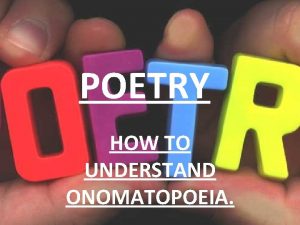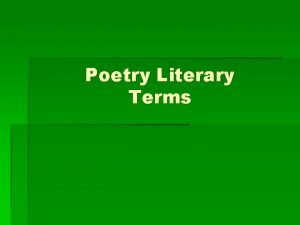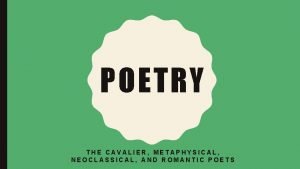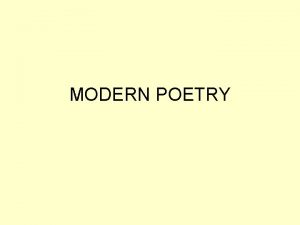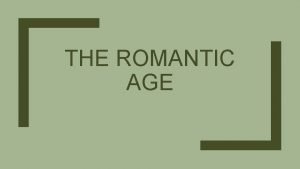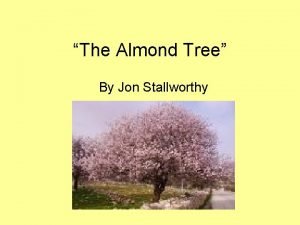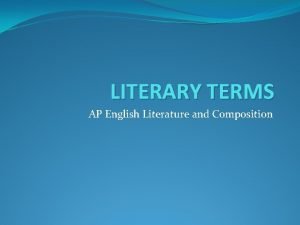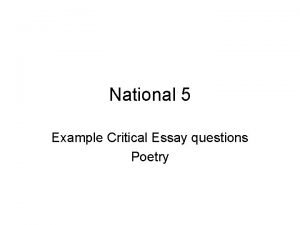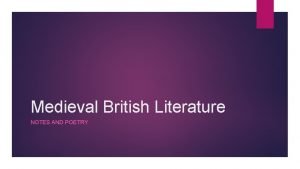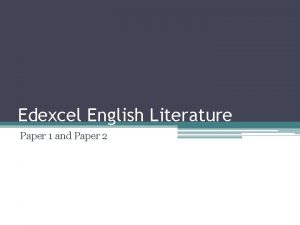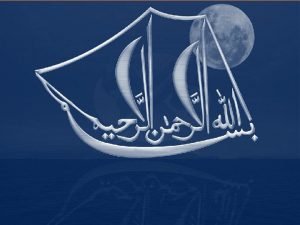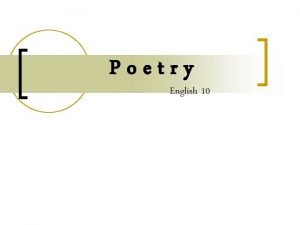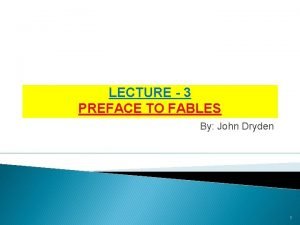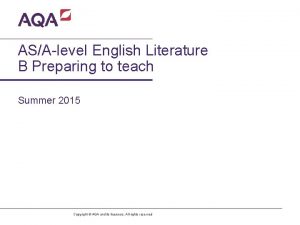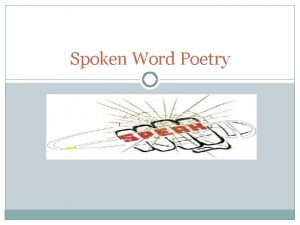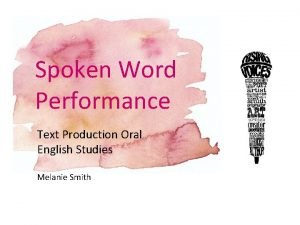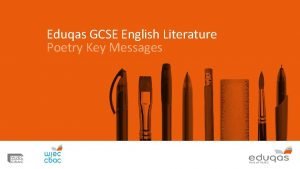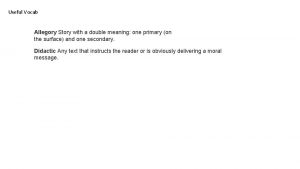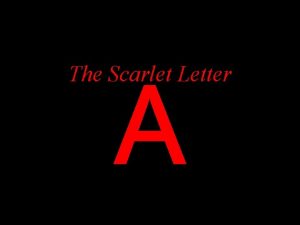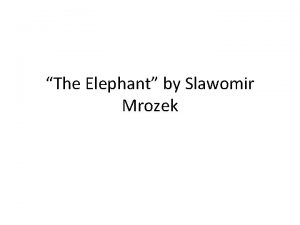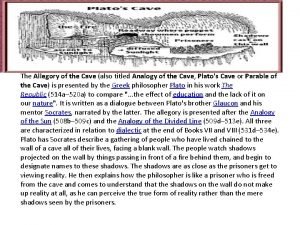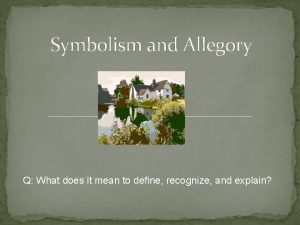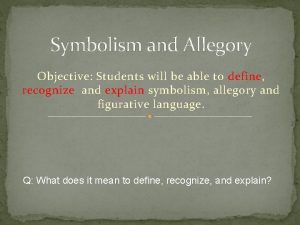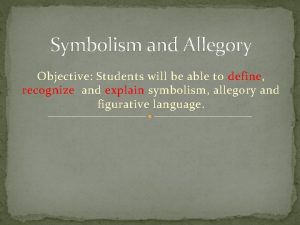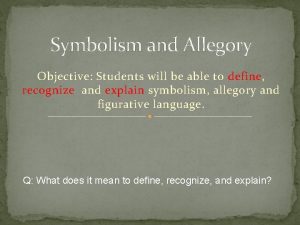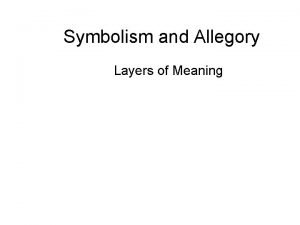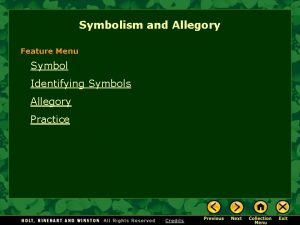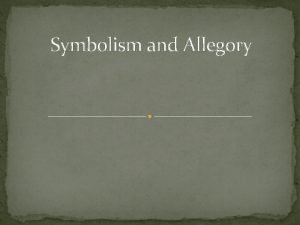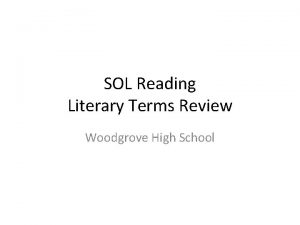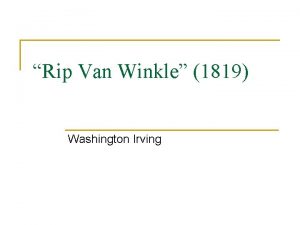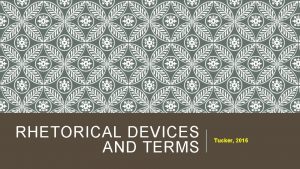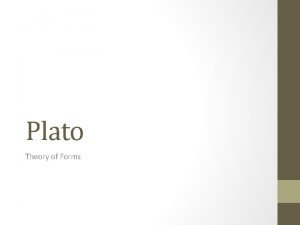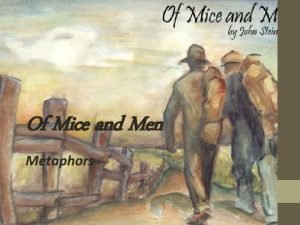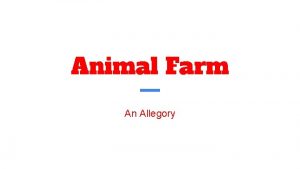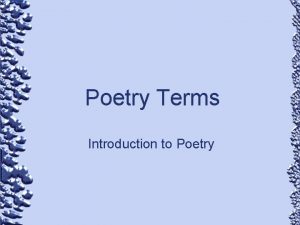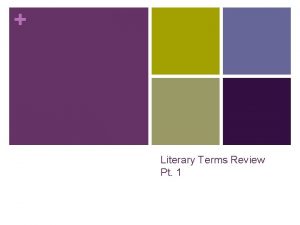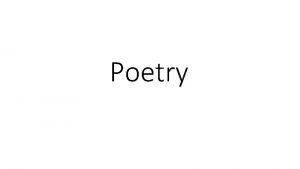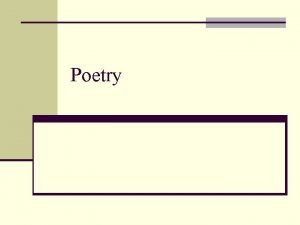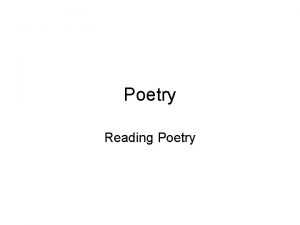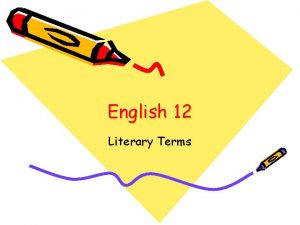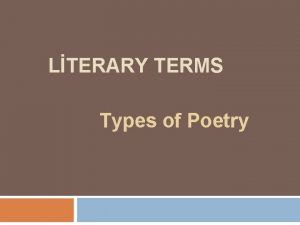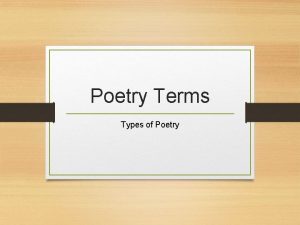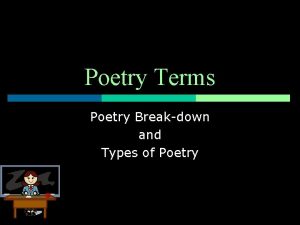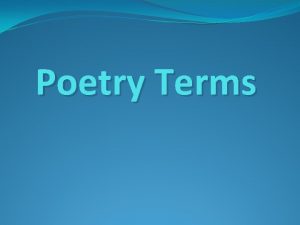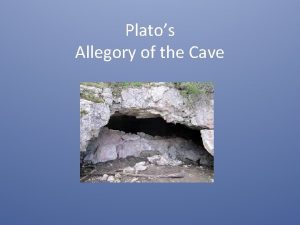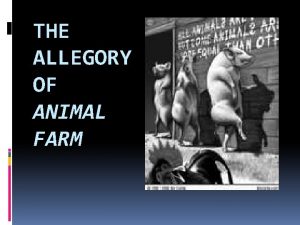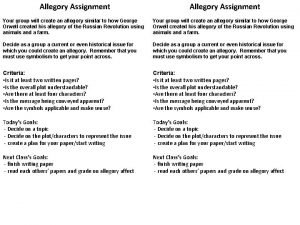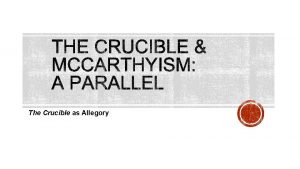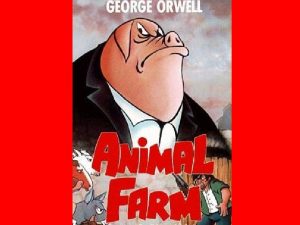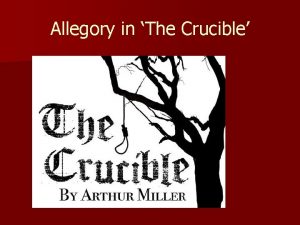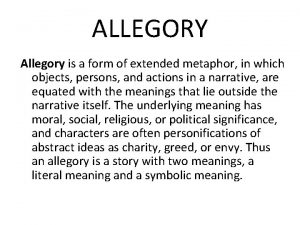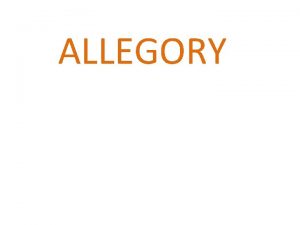English 11 Poetry Terms English 11 Allegory A















































- Slides: 47

English 11 Poetry Terms

English 11 Allegory • A group of abstract ideas that can serve as an extended metaphor for a particular object/event, usually political.

English 11 Alliteration • The repetition of consonant sounds at the beginning of words. • Eg. : “To sit in solemn silence in a dull, dark, dock…”

English 11 Allusion • A reference to another well-known work of literature • Eg. : The Bible, myths, legends, popular culture, etc.

English 11 Apostrophe • Form of poetry addressed to a person absent, or to some inanimate object or entity • Eg. : Twinkle, twinkle, little star/ How I wonder what you are…

English 11 Assonance • The repetition of vowel sounds within words • Eg. : “Poetry is old, ancient, goes back far. It is among the oldest of living things. So old it is that no man knows how and why the first poems came. ” - “Early Moon”, by Carl Sandburg

English 11 Ballad • Poem Type: Traditional narrative verse form, originally sung, which tells a story. Usually has a refrain or chorus. • Eg. : Coleridge’s The Rime of the Ancient Mariner; Carroll’s The Walrus and the Carpenter, etc.

English 11 Blank Verse • Poem Style: Poetry written in unrhymed iambic pentameter (5 -beats-per-line Shakespeare-type verse). – The word trapeze is iambic – two syllables and the stress is on the second syllable. ("tra—PEZE", rather than "TRA—peze")

English 11 Consonance • Close repetition of consonant sounds before and after different vowels • Eg. Flip-flop, hip-hop, etc.

English 11 Couplet • 2 rhyming lines of verse (AA) with the same number of beats (meter)

English 11 Elegy • Poem Type: A formal lament over the death of a particular person • Eg. : Whitman’s O Captain! My Captain!

English 11 Epic • Poem Type: An extended narrative poem, often exalted or heroic in theme • Eg. : Homer’s The Iliad, or The Odyssey

English 11 Epigram • Poem type: A short witty statement • Eg. : “The reports of my death are greatly exaggerated. ” (Mark Twain)

Epitaph • Poem Type: Poems about the dead that are written to be on a tombstone - usually very short.

English 11 Euphemism • The use of a replacement, usually more delicate, term to describe something in a more roundabout way. • Eg. : “Death” = “to pass away”, or “to kick the bucket”, etc.

English 11 Free Verse • Poem Style: Poetry that has no regular meter or line length

English 11 Hyperbole (Hy-per-bo-lee) • When the poet uses deliberate exaggeration to make his/her point • Eg. : His arms hung a mile out of his sleeves

English 11 Image • A visual picture, described in words

English 11 Imagery • Language used to describe things – most often visual pictures, but can also be actions or ideas. • Figurative language that appeals to the 5 senses. It helps the reader picture what is being described.

English 11 Lyric • A poem that does not tell a story. The purpose is to explore emotions and personal experience. • (Most poetry and songs written today) • Originally, a poem sung to accompany a lyre, or early harp

English 11 Metaphor • A direct comparison of one thing with another • Eg. : “My love is a red, red rose. ”

English 11 Metre/Meter • Refers to the number of stressed and unstressed syllables in a line of poetry

English 11 Mood • A poem’s “atmosphere”, given through imagery and rhythm. • The “feeling” presented in the story. • Eg. : It was a dark and stormy night…

English 11 Narrative • Poem Type: Poetry that tells a story – Characters, beginning, middle, end…

English 11 Octave • An 8 -line stanza

English 11 Ode • A long, serious and dignified lyric poem, often written “to” someone or something. – Similar to Elegy

English 11 Onomatopoeia • Words which sound like their meanings • Eg. : ! P O M A W H ! W BOOM ! Z ! G IN

English 11 Oxymoron • When 2 ideas/concepts that mean different things are purposely put together • Eg. : “Freezer burn”; “Dodge Ram”, etc.

English 11 Paradox • When something appears to contradict itself, but turns out to be actually true in the end • Be cruel to be kind • Bittersweet

English 11 Parody • To ridicule a specific type of literature, by making it appear less important than it is. • It usually it copies the style and voice, and sometimes language of the original for comedic effect. • Ex: Weird Al

English 11 Pastoral • Poem Type: Type of literature that deals with rural or country life

English 11 Persona • The first-person narrator of a poem • Often a substitute for the author’s “voice”

English 11 Personification • When inanimate objects are given human-like qualities or characteristics • Eg. : The chair groaned when I sat down The leaves danced in the wind

English 11 Quatrain • A 4 -line stanza

English 11 Repetition • The repeating of a particular element in a work for deliberate effect

English 11 Rhyme • The repetition of similar or duplicate sounds at regular intervals, usually at the end of a line of poetry

English 11 Rhyme Scheme • The particular arrangement of rhymes in a poem, stated as an alphabetical sequence where the letters correspond to a particular rhyme • Eg. : A limerick’s rhyme scheme is AABBA

English 11 Rhythm • The sense of movement given by the pattern of stressed and unstressed syllables in a line of poetry

English 11 Sestet • A 6 -line stanza

English 11 Simile • A direct comparison using like or as • Eg. : “My love is like a red, red rose. ”

English 11 Sonnet • Poem Style: A poem of 14 lines that fits one of the following types: – Petrarchan (Italian)= octave + sestet (8 + 6) • Abbaabba + cdecde or cdcdcd – Shakespearean = 3 quatrains + couplet 3(4) + 2 • abab+cdcd+efef+gg

English 11 Stanza • A poetic “paragraph”, named after the number of lines it contains: couplet (2), quatrain (4), sestet (6), etc.

English 11 Symbol • Something that represents something else

English 11 Tercet • A 3 -line stanza

English 11 Understatement • Also called meiosis • The deliberate downplaying of something to make it seem less than it is.

English 11 Verse • Lines of words arranged in metered patterns • Also can refer to a single line of a poem

 Allegory
Allegory Like terms and unlike terms in polynomials
Like terms and unlike terms in polynomials Combining like terms practice
Combining like terms practice Examples of poetry terms
Examples of poetry terms Formal division of lines in a poem, considered as a unit.
Formal division of lines in a poem, considered as a unit. Poetry terms and examples
Poetry terms and examples Poetic devices
Poetic devices Examples of repetition in poetry
Examples of repetition in poetry Diamante definition poem
Diamante definition poem Ap lit poetry terms
Ap lit poetry terms Crycrycrycrybank
Crycrycrycrybank Poetry word search
Poetry word search Poetry terms hyperbole
Poetry terms hyperbole Albatross (metaphor)
Albatross (metaphor) Traditional poetry vs modern poetry
Traditional poetry vs modern poetry Lyric poem template
Lyric poem template Augustan age and romanticism
Augustan age and romanticism The almond tree poem
The almond tree poem Ap lit literary terms
Ap lit literary terms Nat 5 critical essay questions poetry
Nat 5 critical essay questions poetry British literature notes
British literature notes Flower poetry in english
Flower poetry in english Unseen paper edexcel
Unseen paper edexcel Allama iqbal poetry in english
Allama iqbal poetry in english Alliteration poetic device
Alliteration poetic device John dryden as a critic slideshare
John dryden as a critic slideshare English romanticism characteristics
English romanticism characteristics Aqa a level english literature b past papers
Aqa a level english literature b past papers Spoken poetry english
Spoken poetry english Spoken poetry english
Spoken poetry english Eduqas poetry anthology resources
Eduqas poetry anthology resources Sheila birling
Sheila birling Scenenotice
Scenenotice The elephant by slawomir mrozek
The elephant by slawomir mrozek The crucible allegory
The crucible allegory Fahrenheit 451 allegory of the cave
Fahrenheit 451 allegory of the cave Allegory meaning and examples
Allegory meaning and examples Symbol vs allegory
Symbol vs allegory What animal represents arrogance
What animal represents arrogance Symbolism vs allegory
Symbolism vs allegory Allegory vs symbolism
Allegory vs symbolism Allegory menu
Allegory menu Symbolism vs allegory
Symbolism vs allegory Onomatopoeia in shrek
Onomatopoeia in shrek Rip van winkle allegory
Rip van winkle allegory Epiphora definition literature
Epiphora definition literature Plato on reason
Plato on reason Allegory in of mice and men
Allegory in of mice and men
